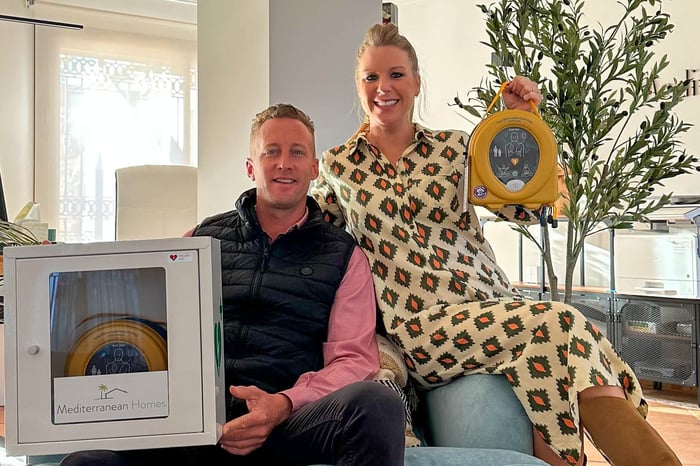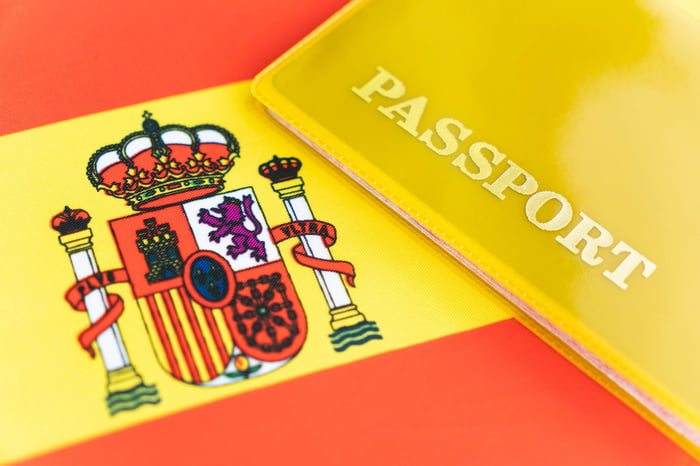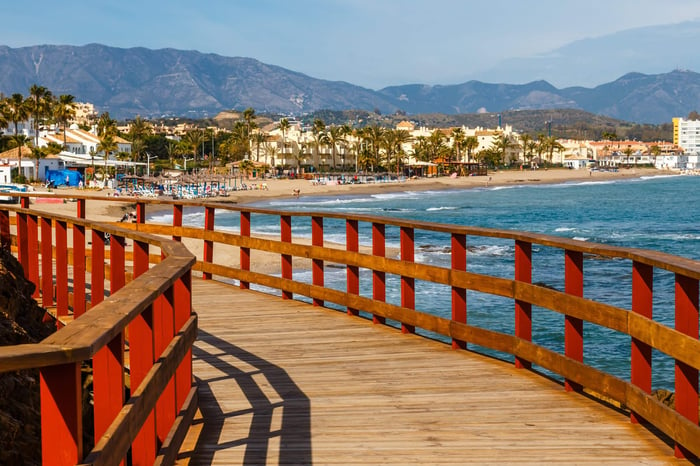Table of Contents
- Mandatory Tourist Rental License
- What is classed as a holiday rental property in Spain?
- Key Changes in 2024 for Tourist Rental Licenses on the Costa del Sol and the rest of Andalucia
- Where to Obtain a Tourist License
- Hiring a Lawyer to Apply for the Tourist License on Your Behalf
- Could this be the perfect holiday home investment property in Spain?!
- Impact on Inland Property Investment
- Conclusion
- Disclaimer
Here's everything property owners and investors in Andalusia need to know about changes in tourist rental regulations made in 2025
✅ Have things changed recently?
Yes: Significant new requirements came into effect in April 2025 (HOA consent, national registry) and were already evolving since 2024 (license, standards, data).
Ongoing: Watch for changes in municipal rules—cities like Marbella, Fuengirola, Coín, Ronda may impose further restrictions.
🆕 2025 Regulation Updates
April 2025 – Ley de Propiedad Horizontal (Horizontal Property Law reform)
Any building owner wishing to operate a tourist rental must secure approval from their Community of Owners by a 3/5 majority vote (both per-owner and quota-based)
After approval, the community may levy up to 20% extra on shared-building expenses for those apartments
This applies even to properties already operating as rentals, though pre-law licences aren't subject to retroactive ban—provided they comply with existing tourism laws .
January–July 2025 – National Unified Tourist Rental Registry
Introduced 2 Jan 2025; all short‑term rentals must now be listed nationally by 1 July 2025, replacing regional systems like Andalucía's
Hosts must display the national registration number on booking platforms; non‑compliance results in listing removal within 48 hours
December 2024 onwards – Enhanced guest and payment data collection
Tourist providers (Airbnb, B&Bs, etc.) must now collect and transmit expanded guest data (names, passport, address, payment info) to authorities, for security and tax purposes
🧭 Summary Table
Year Key Regulatory Changes
2024 Decree 31/2024: stricter licensing, spatial rules, HOA/community restrictions, tax compliance, municipality authority.
Apr 2025 Horizontal Property Law overhaul: community approval and finance surcharges needed for tourist rentals.
Jan–Jul 2025 Mandatory national rental registry; platforms require registration number.
Dec 2024–ongoing Expanded data collection for guests and payments.
🏘️ Impact & What It Means for You
Owners must register nationally and follow space, safety, and administrative standards.
If your property is in an HOA, check its bylaws—3/5 HOA approval is now needed to list as a tourist rental.
Verify your property's independent access, otherwise it may be disallowed by your municipality.
Maintain meticulous records and guest data, and stay current with tax obligations and registry status.
Here's everything property owners and investors in Andalusia need to know about changes in tourist rental regulations made in 2024. From acquiring tourist licenses to navigating new local restrictions, these changes are crucial for anyone renting their property as short-term holiday lets to tourists on the Costa del Sol.
All information in this article has been reviewed and approved of by Francisco Gomez of Gomez Abogados - our recommended lawyer to deal with tourist license applications here on the Costa del Sol.
It's worth noting that most of these restrictions only apply to properties in urban developments and "comunidades" (complexes or communities).
The good news for owners and investors of inland rural properties on the Costa del Sol is that it is a LOT easier to obtain a tourist license and rent out your property to tourists!
Mandatory Tourist Rental License
For anyone renting out a property for short-term stays in Spain, a tourist rental license is compulsory.
Since 12th May 2016, Andalucia has required property owners who regularly rent out properties to tourists to register them as “Vivienda Turística” (Touristic Property) in a dedicated registry. Failing to register classifies the property as “clandestine,” carrying fines of up to €150,000 and could result in a suspension of the rental operation for 6 month to a year. This regulation was recently updated under Decree 31/2024, effective from 22nd February 2024, which brings several changes.
This regulation applies to properties on residential land rented regularly for periods under two months, including whole properties or individual rooms (in which case, the owner must reside on-site). A property is considered “habitually rented” if promoted through tourism channels or rented regularly, even without such advertising, making registration mandatory.
Decree 31/2024, now referring to these properties as VUT (Viviendas de Uso Turístico), updates requirements for tourist accommodations, introducing new criteria and updating existing regulations.
What is classed as a holiday rental property in Spain?
Properties situated on residential land that are regularly rented out for periods shorter than two months are subject to regulation. This applies to properties rented either in full or by individual rooms; however, in the case of room rentals, the owner must reside on-site. The key consideration is the frequency of rentals. The Regional Government's Tourism Department defines a property as being habitually rented if it is advertised through tourism channels such as travel agencies or online platforms. Importantly, even if you do not use these channels for advertising but rent out habitually, registration remains compulsory.
If you are looking to obtain a Tourist License for your property in Andalusia, this license must be obtained from the Andalusian Tourism Registry (Registro de Turismo de Andalucía) before your property can be legally listed on platforms such as Airbnb or Booking.com.
What are the consequences of renting your property out as a holiday let without a license? Properties without a valid license face fines ranging from €2,000 to €18,000. This is just for not having a valid license. Fines for not having one at all can be as much as €150,000 and authorities can enforce closure of the establishment.
Here's a breakdown of the consequences depending on the level of severity:
1. Infringements classified as minor result in a warning or a fine of up to 2,000 euros.
2. Infringements classified as serious result in fines of 2,001 to 18,000 euros. As an additional penalty, the suspension of the provision of tourist services may be imposed, or the temporary closure of the establishment, where appropriate, for a period of no less than six months.
3. Very serious infringements result in fines of 18,001 to 150,000 euros. As an additional penalty, the temporary suspension of the provision of tourist services may be imposed, or the temporary closure of the establishment or accommodation unit, where appropriate, for a period of between six months to three years.
For the official guide, visit this link:
https://noticias.juridicas.
This applies to all properties on the Costa del Sol including rural holiday homes and Spanish inland villas, which are increasingly popular among tourists seeking a more authentic Andalusian experience away from the coast. Securing this license is a top priority for renting properties in towns like Coín, Mijas Pueblo, and Álora.
Useful Tip: How to Easily Translate a Webpage from Spanish to English
Some of the links provided in this article take you to the original bulletins outlining all the details of the new laws provided by the Spanish Government. They will be in Spanish so here's a little technical tip... There is no need to copy and paste the contents of a website into Google Translate.
Most browsers these days offer a translation tool without having to install any plugins. Simply right-click any blank space on the web page and click on the "Translate to English" option and it will translate the text for you immediately!
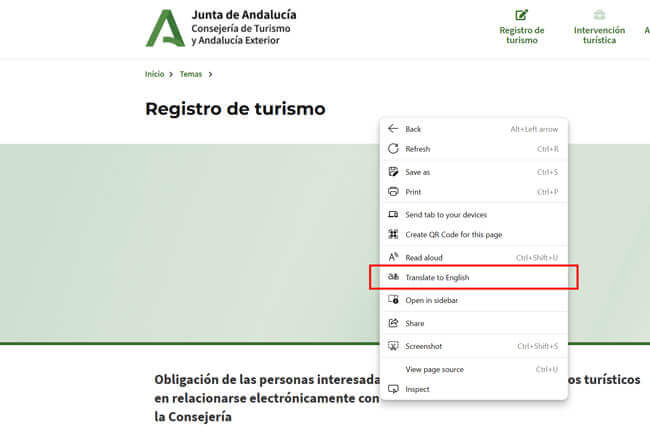
Key Changes in 2024 for Tourist Rental Licenses on the Costa del Sol and the rest of Andalucia
The new law aims to balance tourism with residents’ quality of life, as tourism reached record numbers in 2023 and 2024. By regulating tourist rentals, the law ensures they coexist sustainably with other forms of tourist accommodation, maintaining a quality and organised supply.
Additionally, the law addresses unfair competition from unregistered rentals, which harm the regulated tourism industry and evade government oversight. This unregulated activity can lead to black-market income and create conflicts with residents. By supporting compliant rentals, the law helps protect the legitimate tourism sector and reduce unfair competition.
1. First Occupation License
The requirement to provide a First Occupation Licence (F.O.L.) with the responsible declaration has been removed. Now, applicants must declare that the property adheres to urban planning regulations. This change benefits properties lacking an F.O.L., but it’s essential to ensure compliance, ideally by obtaining a certificate from an architect.
According to provision 9.2 of the new decree, if the Tourism Administration finds any inaccuracies or falsehoods in the declaration, or if the property fails to meet the registration conditions, the property’s listing in the Andalusian Tourism Registry will be cancelled. This provision highlights two important points:
- Registering a property as a holiday home solely to protect it from future restrictions, without intent to actually rent it, could result in its registration being cancelled.
- Although an F.O.L. isn’t required at registration, a missing licence may lead to cancellation if an inspection later determines non-compliance with urban planning rules.
2. Supreme Court Ruling on Community Restrictions
A landmark ruling from Spain’s Supreme Court now classifies tourist rentals as an "economic activity," meaning that residential communities (comunidades de propietarios) can vote to restrict or even ban short-term rentals within their buildings. For rural properties, especially those in small village developments or gated communities, it’s essential to confirm whether there are any such restrictions before renting. This must be provided when applying for a tourist license by requesting a certificate from the Land Registry office stating that the community has not banned owners from renting their properties out in that community.
3. New Authority for Local Municipalities
In 2024, the Junta de Andalucía (the institution in which the self-government of the Autonomous Community of Andalusia is organised) granted municipalities more control over regulating tourist rentals. This is particularly relevant for inland towns and rural areas, where local councils now have the discretion to limit the number of tourist licenses issued or impose specific conditions to address tourism’s impact on local communities.
This change has already been implemented in the towns of Malaga and Fuengirola, where both Town Halls have prohibited VUTs (holiday rental properties) unless they have independent access from the street. Essentially, this means that only detached houses or ground-floor apartments can now be registered, effective since 22 February 2024.
In towns like Coín, Monda, and Ronda, where the demand for rural holiday lets has surged, municipalities may introduce stricter rules regarding rental properties to preserve the tranquillity and character of these areas.
It is worth noting that any tourist licenses that were issues before the 22nd of February 2024 could be cancelled by the local authorities until the new certificates such as the certificate from the community stating they have not banned tourist lets are provided to them.
4. Tightened Occupancy and Safety Standards
- One of the key changes is the introduction of a minimum floor area requirement of 14 square metres per guest. This means studios under 28 square metres will no longer be eligible for rental to two people.
- Bathroom requirements: two bathrooms if the property accommodates more than five guests, and three bathrooms if it accommodates over eight.
- Provision of both air conditioning and heating.
- 24-hour telephone assistance.
- A first aid kit.
- Installation of either smoke detectors in the kitchen area or a fire extinguisher.
- Additionally, a new annex outlines standards for household items and furnishings in tourist accommodations. You can find detailed requirements in the annex on pages 9 and 10 of Decree 31/2024, dated 29th January, published in the BOJA (accessible here).
Failure to comply can result in fines ranging from €6,000 to €12,000.
Here are more details regarding the floor area requirements for renting out apartments as tourist lets:
- For standard apartments: 28m2
- Minimum area for single bedroom: 7m2
- Minimum area for double bedroom: 10m2
- Minimum area for triple bedroom: 16m2
- Minimum area for quadruple bedroom: 22m2
- Minimum area for studio: 20m2
- Minimum area for bathroom: 3m2
- Minimum area for living-dining room: 10m2
- Minimum area for kitchen: 5m2
Download PDF outlining all requirements (Spanish)
Download PDF outlining all requirements (English - Google Translated)
5. Tax and Income Declaration
Property owners in the inland Costa del Sol must ensure they comply with the tax regulations for short-term rentals. All rental income must be properly declared, and owners are subject to IRPF (Income Tax) on their earnings. Those failing to declare rental income face fines that start at €1,500 and can go up to €5,000 for more severe cases of non-compliance. It’s crucial to work with a tax advisor to avoid these penalties and to deduct allowable expenses for property maintenance and improvements.
Where to Obtain a Tourist License
To apply for a tourist license in Andalusia, follow these steps:
Register Online: Visit the Registro de Turismo de Andalucía website at Registro de Turismo de Andalucía and complete the application form.
Provide Documentation: You will need to submit proof of property ownership, safety compliance certificates (such as proof of smoke detector installation), and a description of the property, including the number of rooms and maximum occupancy.
Fees: there are now no fees to pay the local authorities to apply for a tourist license. If you hire a professional to apply for you, they are responsible for charging their own fees.
Inspection: In some cases, authorities may conduct an inspection of your property to verify it meets safety and quality standards.
Receive Your License Number: Once approved, you will be issued a tourist license number, which must be included in all online listings and advertisements for your property.
Hiring a Lawyer to Apply for the Tourist License on Your Behalf
If you prefer to instruct a lawyer to obtain the tourist license on your behalf, we personally recommend Francisco Gomez. Click on the following link to visit Gomez Abogados website.

Could this be the perfect holiday home investment property in Spain?!
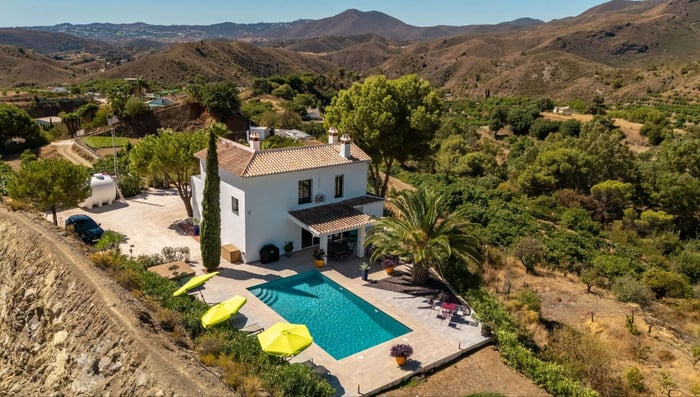 Stunning 3 bedroom detached villa located very close to Alhaurín el Grande and Alhaurín Golf
Stunning 3 bedroom detached villa located very close to Alhaurín el Grande and Alhaurín GolfThis beautiful, detached villa is located on the south side of the charming village of Alhaurín el Grande, near the prestigious Alhaurín Golf. With excellent road access, this property offers both convenience and privacy.
Impact on Inland Property Investment
Despite the regulatory changes, the rural and inland areas of the Costa del Sol remain attractive for property investors. Many tourists seek the tranquillity of the countryside, driving demand for holiday lets in places like Monda, Guaro, and Casarabonela. Properties that come with pre-approved tourist licenses or meet the new safety and occupancy standards already are particularly valuable, as they save owners time and money.
Here at Mediterranean Homes, we know all our vendors and their properties inside out so if you are looking for a holiday rental investment property in the Spanish countryside, we believe we are the best estate agents to help you find the ideal investment property.
Conclusion
The 2024 changes to tourist rental regulations in the inland areas of the Costa del Sol highlight the importance of staying informed and compliant. Whether you are looking to purchase a villa in Coín or a rustic finca in the Guadalhorce Valley, working with a reputable and experienced estate agent like ourselves will help secure a safe and profitable investment.
Disclaimer
Be sure to conduct thorough due diligence before purchasing a property for rental purposes, including checking for local restrictions and ensuring that the property meets all safety standards.
By partnering with legal and tax professionals, you can confidently navigate these regulatory changes and enjoy the benefits of rural property investment in one of Spain’s most beautiful regions.
At the time of writing this informational article on the 27th of October 2024, all information is correct and accurate. Med Homes SL takes no responsibility for any consequences caused by any individuals who have relied on this information to make any transactional decisions or other actions.




